When you’re hot and bothered, it’s a relief to turn on your air conditioner. But what if your AC needs some TLC or is not cooling or not even turning on? That’s right; you’re going to be sweating profusely and wishing for cooler temperatures. Not to mention how much money you’ll be spending this season to keep your home cool. So, here’s a way to save some dough! It’s time for an annual AC tune-up – don’t wait until something goes wrong to get it done. AC tune ups help protect your AC from breaking down and can also increase airflow and reduce energy costs! Here’s what you need to know about AC tune up!
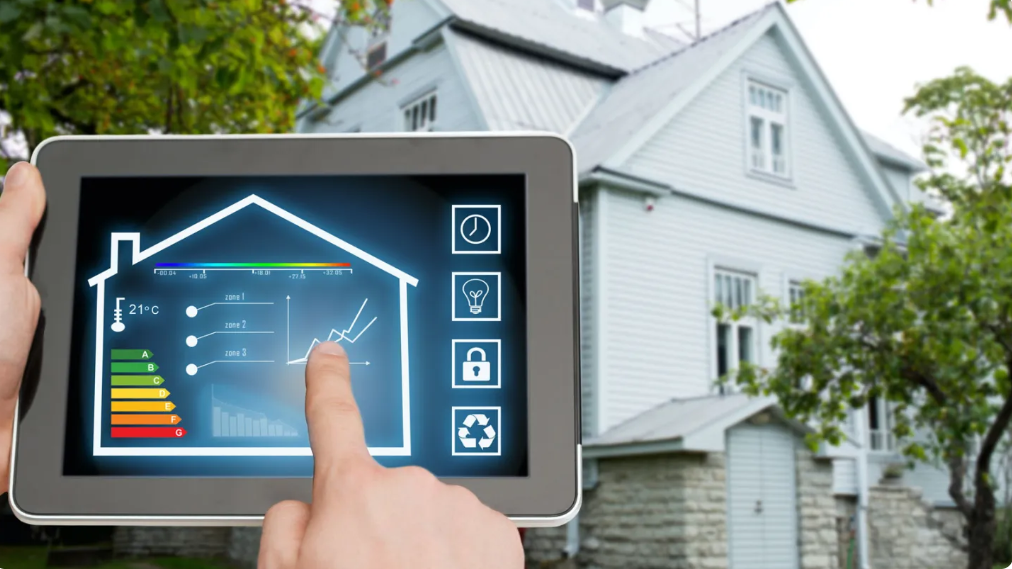
1. What Is An AC Tune Up?
During an AC tune up, an HVAC specialist ensures that all the components in the AC system are operating correctly. Each air conditioning system component is cleaned, adjusted, and tested for efficiency as part of the inspection. When your HVAC system is regularly maintained, you can prevent frequent AC repair issues; increase system efficiency; and extend your system’s lifespan by preventing dirt, corrosion, and replacing costly parts before the damage becomes significant.
2. What Are The Benefits Of An AC Tune Up?
The best way to have a comfortable home is with an efficient air conditioning system. AC maintenance is a great way to keep your air conditioning system running smoothly and efficiently. Have you been putting it off? If so, you’re not alone. Unfortunately, most people don’t realize the importance of regular maintenance until there’s a problem with their equipment that can’t be fixed right away. Due to the fact that AC problems are often caused by neglect, regular AC maintenance can significantly prolong the system’s life, prevent breakdowns, and reduce your utility bills. Without routine HVAC maintenance, you’re putting yourself at risk of spending a lot of money down the road while suffering through the heat.
2.1 An AC Tune Up Prevents repairs
An AC tune up saves money by avoiding extensive repairs (if not all repairs), which almost always cost more than preventive tune ups. Regular maintenance will pinpoint minor issues before they become big problems – keeping your AC running smoothly for years to come. One broken part could cause others to deteriorate because all components work together like cogs in a wheel or gears on a bicycle; when one fails, others suffer. AC tune-ups prevent minor problems from becoming more extensive and thus more expensive repairs. You don’t have to wait until you are out of cool air and a chunk of change before you get your AC system checked out.
2.2 Maintenance Extends Your Air Conditioner’s Lifespan
If you want your AC system to last as long as possible, then maintenance must be done regularly. AC systems that are well-maintained typically last longer than those that aren’t. For example, regular maintenance can extend the life of an AC up to 15 years, while a neglected system can cause it to fail as early as 5 to 8 years after installation.
2.3 AC Tune Up Lowers Utility Bills
A well-maintained AC system is an efficient and comfortable one. When your air conditioning unit runs at peak performance, you’ll stay cool all season long without breaking the bank! Furthermore, a properly functioning air conditioner saves money on monthly energy bills since it operates more efficiently than a poorly maintained cooling system.
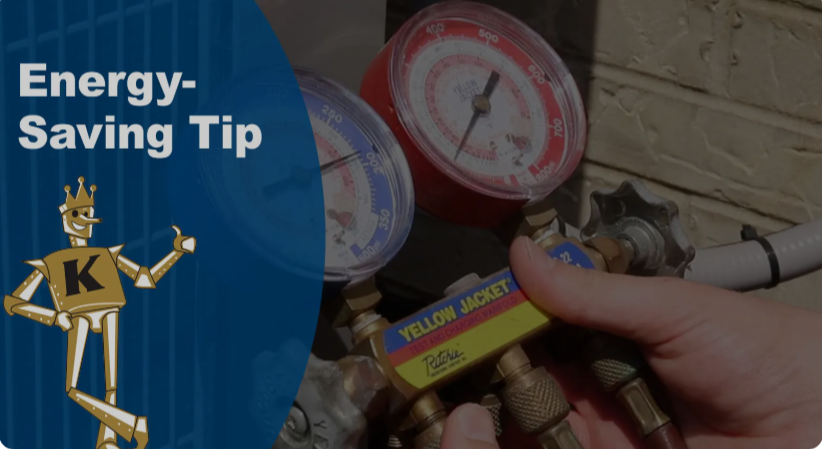
3. How To DIY AC Tune Up:
Routine maintenance is essential to maintaining your home’s heating and cooling systems. So you may be wondering, “can I provide routine maintenance for my air conditioning system?” Absolutely! There are simple steps the homeowner can take to support their AC system this summer. Read more to explore how to care for your HVAC system!
Step 1: Change Filter For AC Maintenance
The filters are an essential part of your HVAC system. They prevent dirt and dust from getting into AC which can cause problems down the line for you! Make sure that these particles don’t block your air flow by changing them often enough so they’ll work as well when needed most. We recommend changing out those filters at least four times a year to do this properly. A household with a pet or a member prone to allergies or asthma should change its air filters every six weeks. How dirty is your air filter? As a help to you, we have a guide to changing your AC filters if you want to learn more.
Another way to promote proper air flow is to make sure all registers are open and free from obstructions, furniture, etc. If you want to keep your home cool and comfortable, the air flow must be optimal.
Step 2: Examine Drain Line
Cleaning and inspecting the drain line is another preventative maintenance step homeowners can take. The drain line is a white pipe on the side or front of your furnace, which is responsible for draining condensation away from your indoor AC unit. If you have a high-efficiency furnace, your furnace and AC most likely share a condensate drain line. If this line becomes clogged, the system will not drain the condensation properly, which can lead to your AC leaking water.
To prevent this from happening, it’s important to check and clean the condensate drain line regularly. If there is an accessible part of your drain line, pour water inside and assess whether it drains correctly or gets backed up.
As you look over the drain line, pay close attention to any cracks or holes in the drain line which will cause your HVAC system to leak. If you notice any damage, it’s essential to have it repaired as soon as possible. Next, confirm the condensate drain line is firm, secure, and in its proper place.
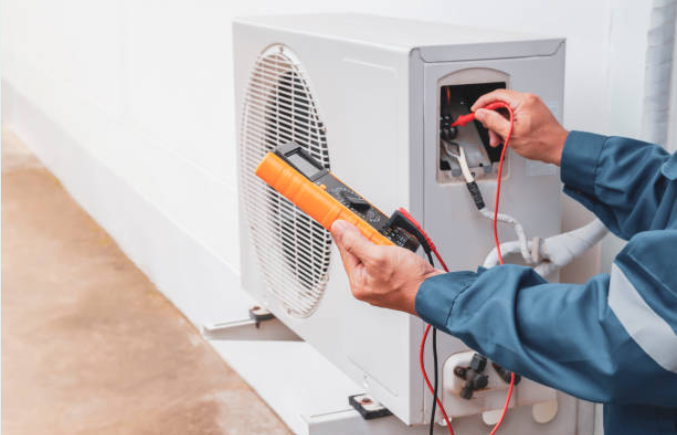
4. What Does An AC Tune Up Include From An HVAC Pro?
A cooling system is an essential part of most homes. The HVAC specialists who install them – such as us here at SuperTech – are master craftsmen, and they take great pride in up keeping their work! You can read an in depth list of cooling maintenance tasks from the AC Contractors of America here. But to get the main idea keep reading below!
4.1. Check Thermostat
Your home’s comfort depends on a lot of things, but it starts with your thermostat. If you are interested in checking for problems with your thermostat on your own, we can walk you through how in our blog about thermostats not working. Otherwise, you can have an HVAC professional check it for you. They will test, inspect, and adjust any internal wiring in order assess if everything is functioning correctly. After review, the technician will change the batteries or re-calibrate the thermostat if necessary.
4.2. Evaluate the AC Cabinet & evaporator coil
During an air conditioning tune-up, the HVAC pro removes the front panel from the AC to inspect the evaporator coil’s condition thoroughly. The evaporator coil is typically positioned above your furnace. The purpose of the evaporator coil is to absorb the heat from the air in your home. After the air passes over the evaporator coil, it is cool enough to be redistributed back into your home. If the evaporator coil is dirty, frozen, or leaking, you will have AC problems. If the HVAC technician notices any of these problems, they will alert the homeowner and provide them with the best options for the next course of action.
4.3. Evaluate Drain Pan
An HVAC pro cleans the drain pan during an AC tune-up and inspects it for any damages. The drain pan sits beneath the evaporator coil inside your indoor AC unit. When warm air passes over the cold evaporator coils, condensation forms and drips off the coil. The pan collects residual moisture, keeping other parts of your HVAC system safe from damage. Therefore, the drain pan must be evaluated for cracks, holes, mold, and improper positioning.
4.4. Inspects indoor blower motor
The AC blower motor is responsible for drawing air from inside your home and pushing it over the evaporator coil. During a maintenance visit, an AC technician will evaluate your blower motor’s cleanliness, condition, and efficiency to ensure proper functioning. They will take this time to clean the blower motor and test its performance with an amp draw.
If you’d like to know what problems your technician may find with your blower or condenser fan, check out our blog about broken AC fans.
4.5. Evaluate airflow During AC Tune Up
The efficiency of an air conditioning system is drastically reduced without proper airflow. When an HVAC specialist performs an AC tune-up, they assess your ductwork, check that all vents and registers are open and operating properly, and change your air filter. After that, they will test the static pressure to determine the efficiency of the airflow. Proper air flow is a significant factor affecting how comfortable we are in our home.
4.6. Visible Condensate Inspection & Removal
The HVAC technician will examine the drain line piping, drain, and condensate pumps for proper operation. They will clean, repair, or replace as necessary.
4.7. Test the efficiency and adjust connections on electrical components During AC Tune Up
AC condensers are among the most essential components of an AC system. To cool your home, the unit circulates refrigerant throughout your AC system to release the heat from your home outside. The HVAC technician tests the AC condenser for any internal damages with specialized tools.
Inside the AC outdoor condenser, there are multiple electrical components. An HVAC pro assesses their efficiency through measuring voltages and amp draws. While performing an AC Tune up, they tighten the wires and connections, as well as test the performance of the fan motor, contactor, compressor, and capacitor.
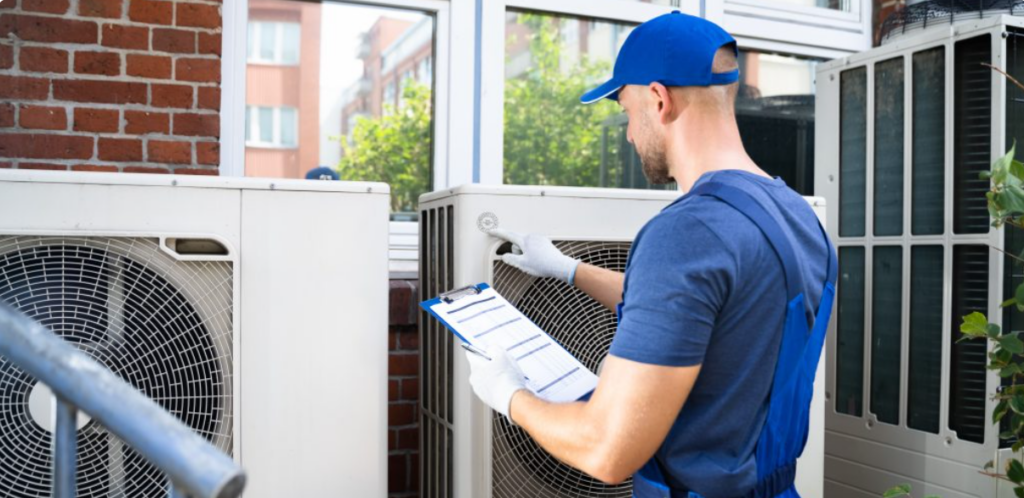
4.8. Evaluates the Outer Condition of AC condenser Unit
HVAC technicians inspect the external condition of the AC condenser. They determine if the AC condenser is level and assess the overall unit for rust. Additionally, they review the condenser fan for any problems.
4.9. AC Tune Up Includes Cleaning Outdoor AC Condenser
A cooling contractor will gently remove the condenser blower fan and clean the inside of the condenser unit. They remove any dirt and debris, as well as clean the condenser coils with water.
4.10. Test Refrigerant Charge During AC Tune Up
Next, the HVAC pro will test the AC refrigerant charge. If it isn’t at the right level, you may experience problems cooling your home. Your air conditioner leaking refrigerant can hurt its cooling performance and efficiency. If the technician determines that your AC does not have the proper amount of refrigerant, they will walk you through all your possible solutions. It’s crucial to detect an improper refrigerant charge before you lose AC this summer.
If you need to refill your refrigerant, it is important to know that the popular refrigerant Freon R-22 is now banned. Learn what that means for your AC in our blog about R-22 Freon!
When the AC tune up is completed, your HVAC pro will provide the homeowners with a System Health Report. This report informs the homeowner of the current status of each HVAC component that the technician examined.
5. How Often Do I Need An AC Tune Up?
Routine cooling maintenance should be performed once a year. Get your annual AC tune up right before the cooling season begins so you can avoid an AC repair during the most critical time of year.
As a side note, it is also important to remember heating maintenance every year. To learn more about what that involves, check out our blog on how to perform a furnace tune-up.
6. How Much Is AC Maintenance ?
AC tune ups can range in price from $40- $200. That said, low-cost air conditioning maintenance typically does not include an extensive and in-depth inspection and cleaning of your AC system.
7. How Long Does An AC Tune Up Take?
An AC system tune up usually takes an estimated 1-2 hours. The length of the cooling tune up depends on the extent of the maintenance being performed and the overall condition and cleanliness of your HVAC system. Be aware that if an HVAC contractor completes the cooling maintenance in less than an hour, it likely is not an in depth evaluation.
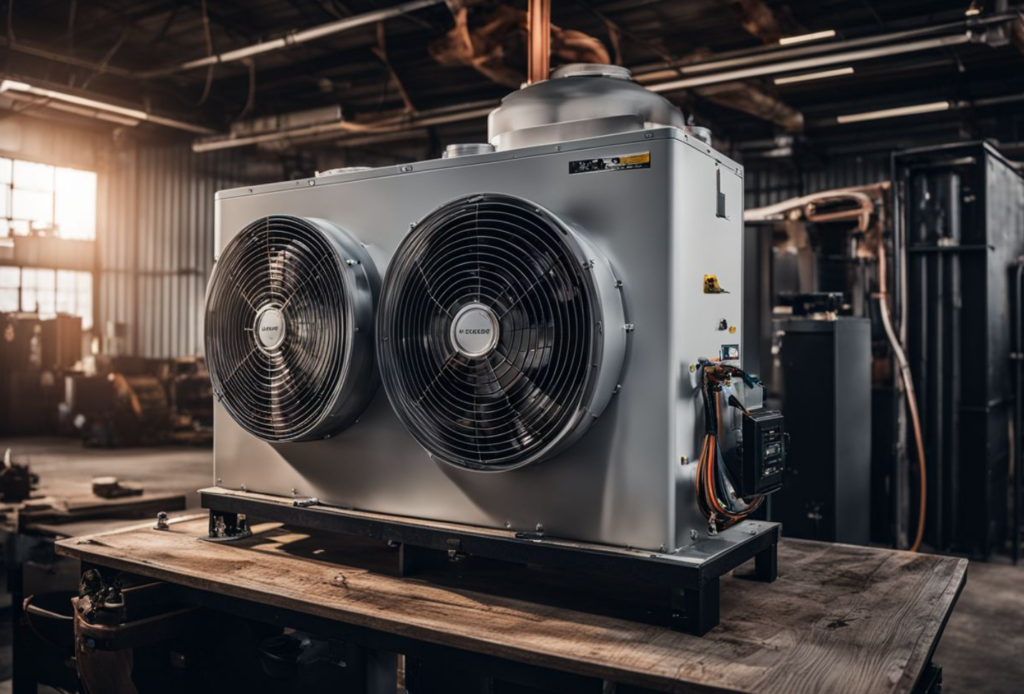
8. Common AC Problems That Are Preventable With An AC Tune Up
8.1. AC Blowing Hot Air
During a cooling system tune up, an HVAC contractor will catch the main culprits that cause your air conditioning system to not blow cold air. Typical reasons include a faulty thermostat, clogged filter, or a dirty condenser coil. An HVAC professional will clean and tighten all the wires in your thermostat, replace your filter, and clean up your AC condenser and its condenser coil. You substantially reduce the risk of your air conditioner blowing hot air with a cooling tune up. Check out our blog about your AC blowing cold air if you want to learn more.
8.2. AC Freezing Up
When any part of your air conditioning system freezes up, you’re in for an avalanche of problems! If your AC condenser, indoor coil, or refrigerant line set is coated in frost, you won’t be experiencing the cold temperatures inside your home that you expect. A frozen AC could be caused by multiple factors, such as a dirty filter, a malfunctioning blower motor, or a low refrigerant charge.
During an AC tune up, critical steps are taken to ensure you do not have a frozen AC this summer. When an HVAC specialist changes your filters, evaluates your blower motor, and tests your refrigerant levels, they eliminate the main factors which could potentially cause your air conditioner system to freeze up.
8.3. AC Leaking Water
The most common reason for a AC leaking water is a clogged condensate line. When an HVAC specialist conducts a routine cooling maintenance, they inspect and clean your HVAC system’s visible condensate line and drain. Therefore, it is very unlikely you will suffer a leaky air conditioner this cooling season. The heating and air conditioning share the same condensate line, so it is important to get a heating tune up before winter as well.

8.4. AC Odors
An AC tune-up can remedy any bizarre odors from your AC unit. Smelly conditions like bio-growth or electrical connection issues are discovered and addressed during an AC system cleaning and inspection. Keep your air conditioner in good hygiene with an annual AC tune up.
8.5. Thermostat Not Reaching Set Temperature
Every summer, homeowners go to war with their thermostat! You can combat your thermostat not reaching its set temperature with a quick AC maintenance call! When you get a cooling maintenance, the internal wiring on your thermostat is inspected and adjusted, and the overall function of your thermostat is evaluated. So, if there is a problem with your thermostat, cooling maintenance should catch it.
Additionally, lack of air flow makes it difficult for your cooling system to keep up with the needs of your household. A dirty filter could be preventing you from getting the cool air from your AC that you expect. Who knew the solution could be as simple as changing your air filters?
8.6. High Energy Bills Due To Short Cycling
Short cycling occurs when the AC system turns on and off rapidly. When this happens, your energy bills will spike regardless of whether you are cool in your home or not. Plus, it is important to point out that constant short cycling will eventually require an AC replacement due to the compressor wearing out. Short cycling can have expensive consequences, but the problem is avoidable altogether. During an AC tune up, an HVAC pro eliminates the most common factors contributing to your system short cycling. They change the air filters, test the refrigerant levels, inspect the duct work, and evaluate the thermostat.
That said, if your AC has reached the point where you are going to need to replace it, make sure to look into some central AC replacement costs to find the best new system for your home!

Not Cool Despite High Energy Bills
If you have an older AC unit, an air conditioning maintenance visit will reveal the age and overall condition of your home’s AC system. Your HVAC system’s age is a substantial factor in its performance, and if it is not keeping up, you will see high energy bills.
Cre: supertechhvac


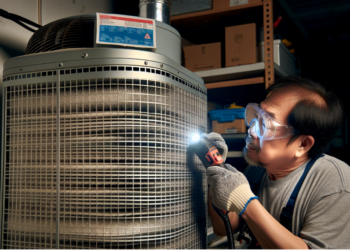
















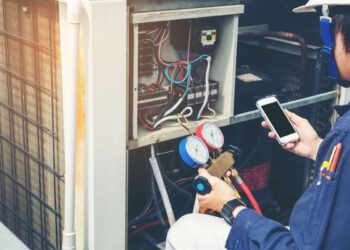
Discussion about this post